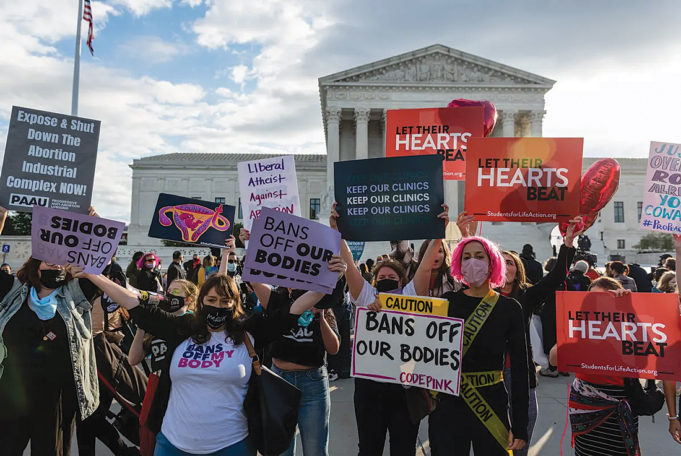The U.S. Supreme Court on Monday grilled attorneys for abortion providers, the federal government, and Texas over the state’s near-total abortion ban — and possibly hinted at support for allowing at least one legal challenge to the law to stand.
The majority of justices pushed back on the enforcement mechanism that has allowed the law to skirt judicial review so far but seemed skeptical of the federal government’s claims that it had a right to sue the state over the law.
The Supreme Court heard hearings over Texas’ abortion law, also known as Senate Bill 8, as part of two lawsuits — one lodged by abortion providers and the other by the U.S. Department of Justice (DOJ). Both focused on procedural technicalities surrounding the law and the suits challenging it, not on abortion rights nor the constitutionality of the law itself.
Those questions centered on whether Texas’ enforcement strategy for the law — which empowers private citizens to sue those who perform or help someone obtain an abortion disallowed by the law — and whether the United States has the right to sue Texas over the statute.
Notably, conservative Justices Amy Coney Barrett and Brett Kavanaugh seemed to push back on Texas’ unique enforcement mechanism. Their line of questioning and comments suggested they might side with abortion providers in condemning the “loophole” that the law exploits to thwart judicial review. Kavanaugh and Barrett, along with three other conservative justices, voted against temporarily blocking the law on Sep. 1, when the law took effect.
Texas’ law, which blocks abortions at about six weeks into a pregnancy, skirts constitutional precedent by forbidding state officials from enforcing it and instead relying on private citizens to sue those in violation. Typically, in suits aiming to overturn laws considered unconstitutional, courts don’t block the laws themselves — they block their enforcement. This is the reason opponents to the law have struggled to name the right defendants to block the law.
Much of the discussion Monday centered on how that enforcement mechanism could be replicated to cast a chilling effect on other rights protected by the Constitution: not just abortion rights but also gun ownership, freedom of the press, and same-sex marriage.
It remains to be seen how the justices will vote. A decision is unlikely to come the same day as the hearing but could be made soon.
The three liberal justices on the Supreme Court and conservative Chief Justice John Roberts voted in favor of temporarily blocking the law in September. If Barrett and Kavanaugh side with them now, it would likely put enough votes in place to temporarily block the law’s enforcement.
However, even if the law is eventually overturned, abortion advocates fear that the right to an abortion remains in grave jeopardy. On Dec. 1, the Supreme Court is set to take up another high-profile abortion case: Dobbs v. Jackson Women’s Health Organization. Many expect that abortion rights could be taken up as part of that case and fear that Roe v. Wade — which, along with subsequent rulings, affirms a person’s right to an abortion before fetal viability — could be overruled.
Under SB 8, people or groups successfully sued can face penalties of at least $10,000. It’s a restrictive law that, if upheld, ends abortion access for millions across the state.
The law has effectively stopped most abortions in the state. All Texas abortion providers have had to shutter the bulk of the procedures they previously offered, with some ceasing to offer any abortions, even ones allowed under SB 8.
Since then, people seeking abortions have sought services in other states, forming backlogs of Texas patients desperate for the procedure.
The law’s unusual enforcement mechanism is leaving abortion providers across the state without a playbook to respond and few options to fight the restrictions in court.
This new law is the latest, most devastating blow from lawmakers who have been on a warpath to steamroll abortion access for decades. Getting an abortion in Texas has become more difficult than anywhere else in the nation.
While the law has widely been referred to as a six-week ban, the reality is closer to two weeks. Calling it strictly a six-week ban fails to take into account the nuance in circumstances many people face when it comes to pregnancy.
A Texas doctor from San Antonio is already facing two lawsuits for performing an abortion illegally under the state’s new law. He announced that he performed the procedure in a Washington Post column, saying that he “wanted to make sure that Texas didn’t get away with its bid to prevent this blatantly unconstitutional law from being tested.”
In addition to this Texas law, advocates on both sides are closely watching a highly anticipated Mississippi case heading to the U.S. Supreme Court that could overturn Roe v. Wade. If the court were to overturn Roe, however, it could lead “trigger laws” across 12 states — including Texas — that ban all abortions to go into effect.
A version of this article originally appeared in The Texas Tribune.












